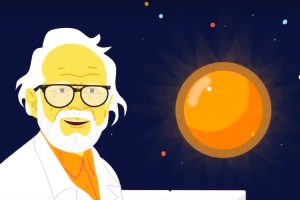D/H ratio in Solar System
Staff Member at Max Planck Institute for Solar System Research, Paul Hartogh, on the use of the deuterium/hydr...
When I meet people and tell them I’m an astronomer, often the first question they ask is: are we alone in the Universe? Are the aliens out there? I have to tell them we just don’t know, there could be. It’s a fascinating question, but we don’t know very much about life in the Universe at all. It’s interesting that if we go back a hundred or two hundred years then most people thought that there was life on other planets. In fact, many people thought for religious reasons, God wouldn’t have made all this space and wasted it by not putting life on it. In the early 20th century the French Foundation gave a prize for the first people to detect evidence of intelligent life in space, but they didn’t count Mars because it was too easy to find life there. Of course, we now know having sent probes to Mars and to other parts of our Solar System that most of them are rather inhospitable places for life. In our Solar System, the Earth is very special as having provided the conditions where life could emerge. There could be some evidence for life on Mars, we don’t know, and there could even be some life under the ice of Jupiter’s moon Europa or Saturn’s moon Enceladus. It’s worth a look, we don’t know. But no one expects any very advanced life on them.
I think, the answer we don’t know, because even though we understand in quite a lot of detail how life evolved here on Earth — from its simple beginnings, maybe 3.5 billion years ago, to the amazing biosphere we see around us and of which we are a part, we still don’t understand the actual origin of life. We don’t understand what caused the transition from complex chemistry on the early Earth to the first objects that we call alive, the first replicating metabolizing structures, we don’t know how this happened. People started to think about this, it used to be something with biochemists relegated to the box of too difficult problems which is important, but were important, but timely. But people are working on this now and I’m hopeful that in the next decade we will have a fairly convincing story about how the very first life formed on the Earth.
And when we have that it will tell us two important things. It will tell us first: was this in some way a rare fluke which we wouldn’t expect to have happened elsewhere. Or is it something which we would expect to happen in any environment that was rather like the young Earth. That’s one thing. It will also tell us whether the particular chemistry of life on Earth, DNA and RNA, and all that, is unique. Or whether there’s a possibility of some quite different kinds of chemistry. Maybe even chemistry that doesn’t need water. Could there even be some kind of life based on methane, on Saturn’s moon Titan, for instance, where we know the rivers of methane? We don’t know that. But in 20 years time we will know, I think, how likely it is that simple life would exist on many of these planets which have been found orbiting other stars in the so-called habitable zone.
But even if simple life is common, we don’t know how likely it is that it would have evolved in the kind of way that happened on Earth, into something as complex as our biosphere, and with an intelligent life. In fact, biologists who are interested in evolution on Earth, they debate this themselves, they asked if you were to rerun evolution on Earth, would we end up with something like us, or might we end up with something quite different, just the planet with insects and nothing else? Because we know that evolution depends on all kinds of contingencies, ice ages, the wiping out of dinosaurs and things like that. If these had happened differently, we don’t know whether you get to intelligent life by some other pathway or not. Because of that uncertainty, even if there is simple life on many other planets, we don’t know whether there is intelligent life. Still less life that would have technology like us, but this is a fascinating question.
But of course, there’s a famous dictum in this game called ‘absence of evidence isn’t evidence of absence’. So even if we don’t see anything through these techniques it doesn’t mean that there isn’t intelligent life, because they might not be sending out a signal, they might be living a contemplative life and not trying to communicate. We have caused absolutely no idea what might exist out there in the form of intelligence or technology. If we are guided by the Earth, then we would imagine that’s the kind of organic life such as us will be superseded by some kind of inorganic, electronic life. The reason for that is that there may be some limit to the amount of intelligence you can store in the sort of hardware that we have inside our skulls, and that can be surpassed by electronic hardware. So post-humans if they are more capable intellectually than us will probably not be organic at all. And they will, of course, not want to be on the Earth, because they may not need gravity, they don’t need an atmosphere. And so the future of intelligence on Earth, the post-human future probably lies away from the Earth.
That suggests that if there’s another planet is where life has evolved in the same way as it has on Earth, then if it’s a lagging behind the Earth then we won’t see anything. Whereas if it’s ahead of the Earth than what we would detect would be not evidence for organic civilization, but evidence for some machines which may have escaped their home planets and are electronic. It’s most unlikely, if we think of the time chart, that we would catch another civilization so synchronized with us they should be in the same stage that we are. It will either be so far behind that we don’t detect anything or so far ahead that we detect something that is inorganic.
Now I’m not holding my breath for success but I’m very glad that there are these programs now, in particular, the one that’s funded by Yuri Milner which means that we may have a chance in our lifetime of answering the fundamental question — are we alone or not? A fascinating question for all of us.

Staff Member at Max Planck Institute for Solar System Research, Paul Hartogh, on the use of the deuterium/hydr...

Computer scientist Erol Gelenbe on different types of cyber-attacks and end-to-end security of health data exc...

Two research groups of astronomers on discovering a rare planet, the celestial body Kepler-432b and “red giant...